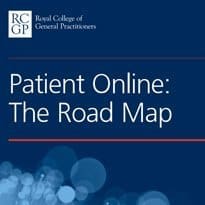GPSoC to mandate online patient access
- 7 March 2013

The IT necessary to provide patients with online access to their GP records needs to be mandated via the GP Systems of Choice contract, a new report states.
The government has made a commitment that by 2015 all patients will have secure online access to their GP record if they want it.
All practices must also make transactional services available online such as booking appointments and ordering repeat prescriptions.
The government asked the Royal College of GPs to lead on the development of guidance to make this goal a reality.
Its report, ‘Patient Online: The Road Map‘, concludes that there are demonstrable benefits for giving patients online access to transactional services, but not to their records.
“Providing online access to records is acknowledged to be potentially empowering for patients and a shared goal for the consumers and funders of health care," it says.
"However, the review so far suggests that there is no immediate major benefit to be gained from online access to records.”
The report says the IT to provide ‘Patient Online’ will need to be mandated through GPSoC and local service providers contract processes.
“There must be commonality between systems and services when patients move practices, which require mandating through GPSoC or other mechanisms, from 2013 onwards,” it says.
A Supplier and Market Liaison Group is mapping out which functional requirements are available and which need to be developed, such as patient authentication.
The new GPSoC contract is expected to be ready by the end of this year.
The report says that giving patients access to their health records online is a “significant information governance risk”, particularly when giving them retrospective access.
“The Defining the Offer Working Group is of the opinion that the component of Patient Online that refers to online records access must be prospective,” it says.
“Retrospective access to records should be considered in due course after practices have considered the necessary practicalities and implications.”
The information governance risks include the need to ensure third-party data is not in the record, identity management and risks to patients in sharing access with others.
“The nature of the medical record may have to change if it is to be used for a new shared purpose, and business process models will have to incorporate any extra time needed to transact in this way,” the report says.
“Transactional services and broadening of electronic communication appear much more promising, and have the potential to be incorporated into a wide range of clinical workflows and business processes.”
About three quarters of practices could offer patients access to their records but only 1% (63 practices) have enabled the functionality.
Around 98% of general practices have the functionality for patients to book and cancel appointments and 37% of practices have enabled these services.
The report says practices can take a phased adoption approach to online records access such as offering patients viewing of their demographic details, then online test results once viewed by the GP, then access to scanned documents and so on.
Over the next two years, there is a need to support and educate the primary care workforce to, “rise to the challenges posed by patient access to transactional services and their own records”.
“The NHS Commissioning Board expectation is that, over this period, there will be a steady and progressive rise in the number of practices offering online services and access to records,” it adds.
“Promotion of patient and public eHealth literacy remains paramount, and is particularly important for disadvantaged groups.”
The report also identifies potential unintended consequences of the use of health IT, such as increasing the number of communications between patients and practices, particularly relating to patient records. It says this may exacerbate the digital divide amongst social groups.
A key ambition in the government’s 2012 NHS information strategy, ‘The Power of Information’, was also that patients should have access to email consultations with GPs.
However, ‘Patient Online’ says that e-consultations with GPs present, “separate and unique challenges” and are therefore not considered in the document.
However, it does consider online communication between administrative staff and patients that does not involve clinical expertise.
“There is a need for further exploration, funding and commissioning of studies on e-consultation, particularly in the setting of online diagnosis and treatment. Before any implementation is considered, the risks and benefits to practices and patients need to be defined,” it says.
Recent survey results suggest records access is not a top priority for GPs.
An exclusive survey for eHealth Insider, conducted by doctors.net.uk, found that 43% of just over 1,000 GP respondents said “we haven’t started to address this yet” when asked how ready they were to facilitate patient access to records.




